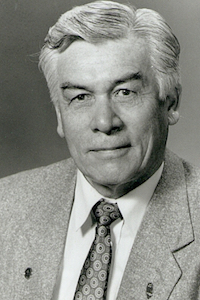James Clayton Gilson was born on February 7, 1926 in Deloraine, Manitoba. He and his six siblings grew up in a loving family in which education, the arts and service to others were stressed. In 1955 Clay married Jean Rudy and they raised four sons, Stuart, Garth, David and Brian.
Clay served for two years in the armed forces and then attended the University of Manitoba. In 1950 he graduated with a B.Sc. in Agriculture. He earned his Master of Science in 1952, majoring in Agricultural Economics because it directly involved people. His mission was to understand farming economics so that he could improve the lives of farm people. In pursuing his goal he earned his Ph.D. from Iowa State University. He returned to the University of Manitoba where he excelled as a teacher, researcher, leader and administrator for forty-six years. He wrote several hundred papers, reports and books and served on many panels and boards. Many government bodies and organizations accepted Clay’s sound thinking, clear analyses of problems and his humane appreciation of the outcome to people. The Canadian agricultural industry relied on his evaluations, recommendations and economic forecasts.
His experience in drought and crop failure in southwestern Manitoba in the 1930’s as well as his knowledge and insight assisted in the formation of the first comprehensive provincial crop insurance programme in Canada. He participated in talks on grain transportation problems and on the Crow benefit. His appointments included the Joint Commission on Grain Trade, the Science Council of Canada, the Canada West Foundation, the Manitoba Crop Insurance Corporation, the Agricultural Advisory Group on Manitoba’s Economic Future and the Canadian Chamber of Commerce. Dr. Gilson was the Canadian representative to many International Agricultural Conferences. He was an authority on the European Common Agricultural Policy and International Trade.
Dr. Gilson received numerous honours and awards during his distinguished career. He was a member of the Manitoba Institute of Agrologists for nearly 50 years, as well as President in 1960-61. In 1966 he was made a Fellow of the Agricultural Institute of Canada, where he served as President in 1981-1982. In 1981 his talents as a teacher were recognized when he received a Distinguished Professor Award from the University of Manitoba. He received an Honourary Doctor of Laws from the University of Guelph in 1987. He was named a Member of the Order of Canada in 1993 and was inducted into the Canadian Agricultural Hall of Fame in 1996.
Clay’s priority was his family. They, his friends and associates will remember his concern, his encouragement, his optimism and his interest in the welfare of others. His contributions to Canadian agriculture will be remembered, with gratitude, by all Canadians.


